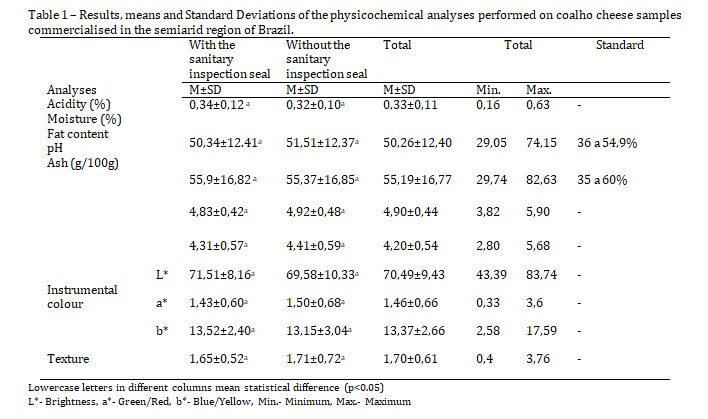Influence of sanitary inspection on the physicochemical quality of coalho cheese
DOI:
https://doi.org/10.21708/avb.2020.14.2.8393Resumo
This study aimed to evaluate the influence of sanitary inspection on the physicochemical characteristics, colour and texture of coalho cheese commercialised in the semiarid region of Brazil. One hundred and thirty-eight coalho cheese samples from commercial establishments in 46 Brazilian cities were evaluated, and physicochemical analyses (acidity, moisture, fat content, pH and ashes), as well as colour and texture tests were performed. The averages for the parameters in cheeses without the official sanitary inspection seal were 4,31, 0.34%, 50.34%, 55.9 and 4.83, for ash, relative acidity, moisture, fat content and pH and in samples with the official sanitary inspection seals we found values of 4,41, 0.32%, 51.51%, 55.37 and 4.92, for the same parameters, respectively. There was no difference in the colour and texture parameters, which for the samples with the official seal were 71.15, 1.43, 13.52 and 1.65; and for the ones without the official seal were 69.58, 1.50, 13.15 and 1.71 for L*, a*, b* and texture, respectively. The fact that the coalho cheese was commercialised with an official inspection seal did not influence the physicochemical, texture or colour analyses.
Downloads

Downloads
Publicado
Edição
Seção
Licença
Autores que publicam na Acta Veterinaria Brasilica concordam com os seguintes termos: a) Autores mantém os direitos autorais e concedem à revista o direito de primeira publicação, com o trabalho simultaneamente licenciado sob a Licença Creative Commons Attribution que permite o compartilhamento do trabalho com reconhecimento da autoria e publicação inicial nesta revista. b) Autores têm autorização para assumir contratos adicionais separadamente, para distribuição não-exclusiva da versão do trabalho publicada nesta revista (ex.: publicar em repositório institucional ou como capítulo de livro), com reconhecimento de autoria e publicação inicial nesta revista. c) Autores têm permissão e são estimulados a publicar e distribuir seu trabalho online (ex.: em repositórios institucionais ou na sua página pessoal) a qualquer ponto antes ou durante o processo editorial, já que isso pode gerar alterações produtivas, bem como aumentar o impacto e a citação do trabalho publicado (Veja O Efeito do Acesso Livre).


 Esta obra está licenciada com uma Licença
Esta obra está licenciada com uma Licença 